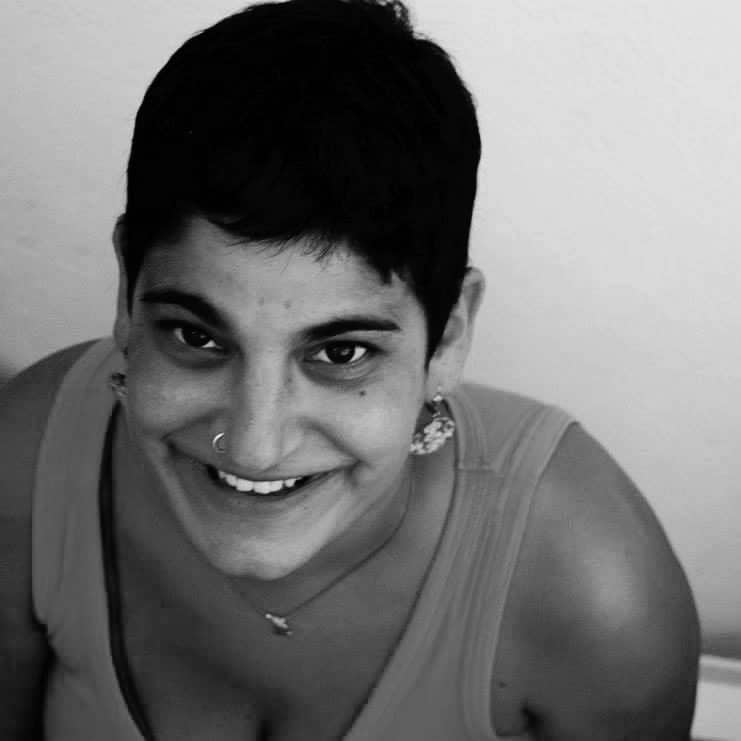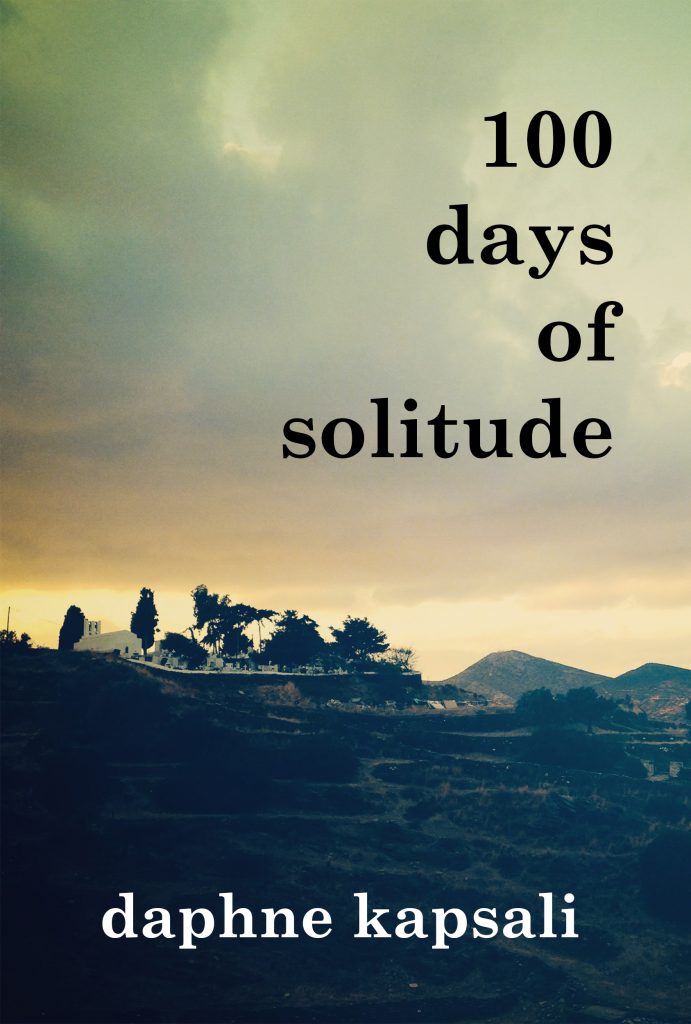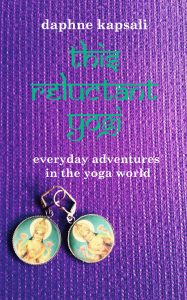By Penny Zalalas

Daphne Kapsalis is a Greek born Londoner who left her job and security in the UK and headed alone to her family home on the island of Sifnos to write a novel. To Daphne’s surprise her first published book ‘100 days of solitude’- a personal journey- has now become a worldwide bestselling self-help book and has been likened to the award winning novel ‘Eat, Pray, Love.’
Daphne has since then published another two books: a novel entitled ‘you can’t name an unfinished thing’ and ‘This Reluctant Yogi: everyday adventures in the yoga world.’
We recently spoke to the bestselling author about her successful books, life on Sifnos island, pursuing your dreams and her personal journey thus far.
Tell us about growing up in Greece and moving to London?
I was born and brought up in Athens, but spent a couple of years in London, between the ages of 3 and 5, while my dad finished his studies. According to my mum, just before we moved back to Greece, I told her, very seriously, that London would be where I’d live. I have a complex relationship with Athens: I love it, as my hometown, but I’ve never felt quite right there, never entirely myself. So when I finished school, I applied to university in the UK and have basically been there ever since. London, with its indifference, gives me the freedom to be who I want to be, in a way that Athens never has. It seems my 5-year-old self had the right idea!
When did your passion for writing begin and what made you turn it into a profession?
I’ve always written, and my dad’s a poet, so there was probably an element of genetic inevitability in it! I remember myself always telling people, dreamily at first and defensively later, that “I’m a writer”, but it took me a long time to realise it could actually be what I do rather than what I said I’d do. Even after I did a Masters in Creative Writing and completed my first full-length novel (as yet unpublished), I treated writing as a “one day” thing. It wasn’t until just over a couple of years ago, when I had a job and a life I loved and still felt kind of empty, that it hit me that “one day” might never come unless I made it “today”. So I gave it all up, job, flat and life, to write full-time. It still terrifies me, but when people ask me what I do, today, and I say I’m a writer, it’s no longer followed or preceded by a “but”.
What genre (if any) of literature would you categorise your books?
I’d always thought of myself as a fiction writer, a novelist, but out of my three published books only one, “you can’t name an unfinished thing”, actually fits that category. It turns out that what I’m good at is what could loosely be described as “essays” on life, the modern condition of living, triggered by incidents and observations from my own life.
What made you decide to head to Sifnos island alone to write?
I’m very lucky, because my family has a little summer house on Sifnos, and I’ve spent every single summer of my life there. But it had always been a holiday destination until I made myself homeless and unemployed, in the name of writing, and Sifnos – rent-free and very low on expenses – seemed like the obvious choice. But I don’t think it was as arbitrary as it sounds – I don’t think anything is accidental: Sifnos has long been known for attracting artists and writers, spending winters here in various degrees of isolation. There’s a reason for that, beyond the practical. There is something about this place that changes you, if you let it.

Tell us about your time alone on Sifnos and writing “100 days of Solitude”.
It was a revelation, in more ways than I can begin to describe. I came here to prove to myself that I was a writer or, if I failed, to disabuse myself of that notion, once and for all, to give up on that dream and move on. So “100 days” began as an exercise in self-discipline, a blog of daily entries for an imaginary audience, to give myself a measure of accountability. Except, as it turned out, the audience was real, and “100 days” became both the process of “becoming” a writer and its product. But beyond that, my time in Sifnos – living alone under such unfamiliar conditions – changed me on a deeply personal level as well. It forced me to question pretty much everything, brought me face-to-face with all of my preconceptions and showed me, ultimately, what was truly important to me. And that process, too, is documented in the book.
Did you think it would become such a success and a self-help guide for others?
Absolutely not! I was shocked when people began following the blog, and, once the book was published, I was shocked that people were buying it. I am still shocked, today, that it keeps selling, and by all the positive feedback I’m receiving, readers getting in touch through the social media to tell me what it’s meant to them. It’s been the most unexpected and most rewarding outcome of this little adventure of mine. I set out to do a thing for myself, to figure some stuff out, but it seems I stumbled upon something universal. But I didn’t set out to teach anybody anything, and I wasn’t writing from a position of someone who has the answers, and I think it’s partly that honesty that people are responding to.
It has been likened to “Eat, Pray, Love” do you agree?
“100 days” is a very difficult book to define, as it doesn’t quite fit any one category or genre. It began as a blog, but it was never really a blog at all; in fact, I’ve often been criticised for posts that are too long, too complex, perhaps a bit too “literally” to qualify as blogging. It’s not a journal, not quite a memoir, not travel writing, though there are certainly elements of that. Quite a few readers are treating it as self-help, in the sense that reading my story motivates them to make changes in their own lives, but I didn’t set out to write a self-help book – which is why I sometimes describe it as an “accidental self-help guide to being yourself”. So I suppose the comparison to “Eat, Pray, Love” makes sense in as far as it’s a journey of self-discovery, a quest for identity that people can relate to, on some level, even if the circumstances that drive it don’t exactly match their own.
It is a personal journey- how did you feel about opening up to the world and revealing private circumstances?
I didn’t really think about it all that much, to be honest. Like I said, when I first set up the blog I didn’t expect anyone would be reading it. But, more than that, I think this is just the kind of writing that comes natural to me. I’m not great at making stories up or writing exciting plotlines, but I look at the world around me and try to find the words to make sense of it, draw out the positives and distil some kind of meaning out of things that may, at first glance, seem meaningless. To use my experience to put something back into the world. And you can’t do that by holding back or trying to edit yourself to sound good. Especially when it comes to what is, ostensibly, a process of self-discovery: anything other than brutal honesty, in that context, would be absurd.
In your opinion, what is the best way for someone to begin living the life they want and how did you come to these realisations yourself?
We live in a culture that encourages us to chase success while telling us to expect disappointment every step of the way. We’re conditioned to value hardship and suffering over ease, and our achievements are relative to the amount of struggling that’s gone into them. And I think it’s this “no pain, no gain” mentality, coupled with the way success is portrayed, that holds a lot of us back from going after the things that truly make us happy. But once you question it, it becomes obvious that there’s no good reason why it should be this way. I had a lovely life, full of the stuff that’s supposed to make you happy, but there was something missing. And it was only by taking that life apart and giving up on the stuff that I realised how little I actually needed, and how little I missed the stuff I’d given up. Which was liberating and terrifying, all at once. I’m not suggesting that everyone gives up their lives and goes off to random islands, but simply that they question the way their lives are put together, and what they can and cannot do without. And give a little more space to the things that matter. That’s how it begins, as small as that.
![Pageflex Persona [document: PRS0000035_00017]](https://greekcitytimes.com/wp-content/uploads/2016/09/unfinished-cover-195x300.jpg) Tell us more about your other two books- “You can’t name an unfinished thing” and “This Reluctant Yogi: everyday adventures in the yoga world.”
Tell us more about your other two books- “You can’t name an unfinished thing” and “This Reluctant Yogi: everyday adventures in the yoga world.”
“You can’t name an unfinished thing” is a novel, literary/contemporary fiction. It’s a love story, like most stories are, but it begins at the end of a relationship and explores whether there are times when the imperative of “moving on” and “letting go” is not the right choice. “This Reluctant Yogi” is similar in style to “100 days”, in that it’s a collection of personal essays/opinion pieces, in this case drawn from my experiences in the yoga world and the extremes we sometimes go to in the name of “spirituality”. In another sense, it’s almost a prelude to “100 days”, since it was written just before my time on Sifnos, and it’s me easing myself into a writing lifestyle.
What type of yoga do you practice and what are your thoughts on the way it has been portrayed since becoming popular in the Western world?
I practice hatha yoga, but that doesn’t necessarily mean all that much; it very much depends on each teacher’s and each school’s interpretation. My yoga is gentle and mindful, and it’s as much – if not more – about striving for balance mentally and emotionally as it is about the physical benefits of the practice. And it’s never a struggle: yoga is not about pushing against your limits, but discovering where they are and respecting them. It’s a constant process of learning and I think that’s partly where its portrayal in the Western world has gone wrong, because ours is a culture of achievement and competition. There is a lot of ego, a lot of self-appointed gurus in the yoga world, and the practice is often sold as an easy ticket to spirituality, or the spiritual alternative to gym classes. It’s often described as a lifestyle, but that’s a modern concept applied to an ancient thing, and no amount of being a soft-spoken vegan who chants “om” every morning will turn you into a yogi. Yoga has never been about what shape you can twist yourself into on the mat, but about how you conduct yourself off it; what you take out of your practice and put into the world.
 What is your advice to people who want to gain all the benefits of yoga practice?
What is your advice to people who want to gain all the benefits of yoga practice?
The only thing you should push against are your preconceptions: approach yoga with an open mind, and try things out. Find a teacher you love – not the most popular or the most famous, but one that you can actually relate to – and learn from them. Don’t compare yourself to anyone else and don’t compete. Yoga is a personal practice, so make it your own; enjoy it for what it means, uniquely, to you. And for the love of everything that’s holy: please, leave your phone out of class.
You are already a best-selling novelist- what has been the highlight for you so far?
Wow, that makes me sound a lot more important than I actually am, but thank you! I think the best thing to have come out of all this, as I already mentioned, is the response I’ve had from readers, and the stories they’ve shared with me in turn. We all hope that our work will touch other people, have a positive impact in their lives, but to see it actually happen, and to have them take the time to tell you about it is incredible. On my bad days, when I feel like giving it all up and getting a “proper” job, any job, it’s those messages that keep me going.
How long does it generally take you to write a book?
In the case of ‘100 days of solitude’, exactly 100 days! ‘You can’t name an unfinished thing’ was written in just under three months, but this was also during my time in Sifnos, so the conditions were near ideal. My first novel, ‘Common People’, took me almost 5 years to complete – mostly because I was trying to fit the writing around everything else that was going on in my life, rather than putting it at the centre. So I guess the most accurate answer would be: it depends on the circumstances.
Do you regularly face “writer’s block” and how do you overcome it?
I wouldn’t say it happens regularly, but it happens. There are days when I can’t imagine writing another word, when I can’t imagine how anything I have to say would be of interest to anyone. But the process of writing “100 days”, the process of producing a piece of writing each day, no matter what, taught me that there is always something to write about, if you look for it. So, when I’m really stuck, I go looking. I take myself out for long walks and just keep my eyes open to what’s around me, and let my thoughts take me where they will. Most of the time, it’s not long before I’ve stopped at the side of the road, typing notes into my phone. But there are times, of course, when nothing works, and you just have to accept it, and give up, and start again the next day.
Are you still based in Greece and what new writing projects are you working on?
I spent last winter in London, but I came back to Sifnos in May, and I’m still here now. I have no idea how long for; I’m sort of living day to day at the moment, and trying not to panic when people ask me how I plan to survive!
In terms of projects, I’ve recently dug out my first novel, “Common People”, which I’m considering publishing, almost 10 years after it was written. Its subject matter – culture shock, racism, and the quest for identity through the eyes of a Greek migrant in 90s London – is particularly relevant in the aftermath of Brexit, so perhaps its time has come. I’m also writing another 100 days-style blog, which I’m hoping will form the basis for a new book later in the year.

